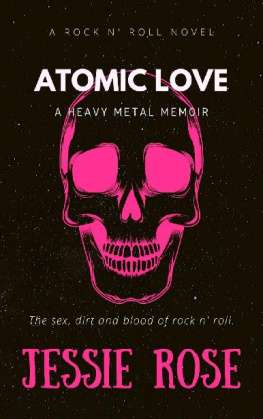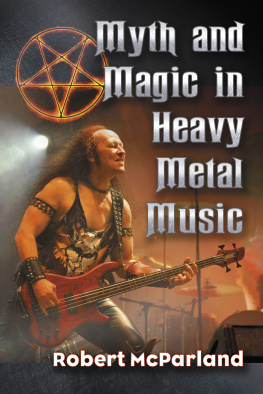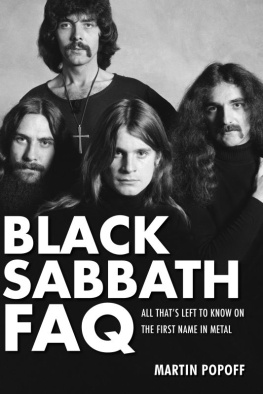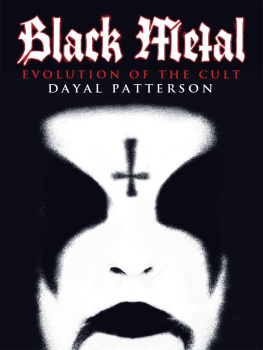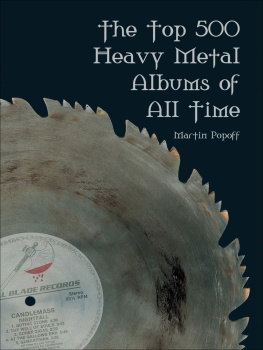I AM THE BLACK WIZARDS: MULTIPLICITY, MYSTICISM AND IDENTITY IN BLACK
METAL MUSIC AND CULTURE
Benjamin Hedge Olson
A Thesis
Submitted to the Graduate College of Bowling Green State University in partial fulfillment of the requirements for the degree of
MASTER OF ARTS May 2008
Committee:
Esther Clinton, Advisor Jeremy Wallach Marilyn Motz
ABSTRACT
Esther Clinton, Advisor
Black metal represents one of the most dramatic, violent and obscure representations of contemporary international popular culture; it is an extremist sect of an extremist sect. An understanding of popular cultures most extreme polarities is imperative to an understanding of its range and general character. I will argue that black metal culture is radically different from all other forms of metal and must be understood as a unique form of cultural expression that signifies a dramatic break from both traditional metal and secular modernism. Although black metal has proliferated across the world, taking up certain indigenous variations in its various locations, it has retained three basic characteristics that make it exceptional and significant: 1.) Black Metal is characterized by a conflict between radical individualism and group identity and by an attempt to accept both polarities simultaneously. 2.) Black metal is centered on an extravagantly romantic view of nature and an idealized past, both of these concepts being very much intertwined. 3.) Black metal celebrates the irrational and primal; it is a critique of modern rationalism and secularism.
TABLE OF CONTENTS
INTRODUCTION. Enter the Moonlit Gate
CHAPTER I. Cosmic Keys to My Creations and Times: the Birth, Definition and Contextualization of Black Metal Culture
CHAPTER II. Diabolical Full Moon Mysticism: Religion, Ritual and the Transcendence of the Mundane
CHAPTER III. My Heart, It Beats the Pulse of Ancient Times: Folklore, Nostalgia and Nature Worship In Black Metal
CHAPTER IV. Voice of Our Blood: Discourses of National Socialism in Black Metal
CONCLUSION
REFERENCES
Introduction: Enter the Moonlit Gate
I first became aware of black metal through an article in Spin magazine in 1996. The Spin article told of devil worshiping Norwegians, burning churches and making cacophonous heavy metal music. In those pre-internet days I was unable to obtain any samples of this strange new music, although my fascination with the article stayed in the back of my mind for many years. In the fall of 2000 I discovered a copy of Emperors Wrath of the Tyrant at a local record store in Missoula, Montana where I was an undergraduate and, remembering the bands name from the Spin article, I bought the album. My roommate at the time and I listened to Wrath of the Tyrant every day for the next year, becoming totally enthralled by the passionate, unique and completely captivating music therein. I have since absorbed as much black metal music and culture as possible, attending concerts, reading books and interviews and occasionally accosting complete strangers in the street who were wearing black metal t-shirts, grilling them for information. This thesis is, in many ways, the culmination of a long-standing fascination with a peculiar outpost of popular culture that most people are totally unaware of.
In 2001 and 2002, I attended a study abroad program at the University of Iceland in Reykjavik and experienced Nordic black metal first-hand for the first time. In 2001 there were numerous wild-eyed black metalers wandering the streets of Reykjavik with Mayhem t-shirts on their backs and self-inflicted scars on their arms. To people from the Nordic countries and Norway in particular, black metal is not a joke. I became friends with numerous Norwegians, many of whom remember all too vividly the days when black metalers were setting fire to every church that they could get their hands on; to these people black metal was something to be hated and feared. In 2005 I traveled to Norway, seeing many of the re-built churches and sites of black metal activity with my own eyes. I also witnessed the overwhelming beauty of the Norwegian countryside that has provided so much inspiration to Norwegian black metalers. For many Norwegians, black metal is not an absurd manifestation of teenage angst, but rather a national trauma.
Very little academic work has been published on black metal. Prior to Michael Moynihan and Didrik Soderlinds history of black metal, Lords of Chaos, which was published in 1998, very few people outside of Scandinavia or the metal community had even heard of black metal. Since the publishing of Lords of Chaos, several books have been written that deal indirectly with black metal, but nothing has addressed black metal culture exclusively.
Numerous scholars have written books discussing heavy metal culture in a more general sense, but these do not address most of what I will be concerned with in my thesis. I have utilized previous scholarship wherever relevant, but due to the extreme lack of scholarship regarding black metal, I have concentrated primarily on first-hand sources.
While the lack of academic and secondary sources has in some ways made the task of writing this thesis more difficult, this reality has forced me to rely heavily on first hand-sources, which in many ways has proven to be this projects greatest strength. While academics have written very little about black metal, black metalers and metalheads in general, have written a great deal about themselves. Magazines, fanzines, ezines and documentaries within the metal community have provided me with a vast store of interviews and articles to draw from. Major metal magazines like Decibel and Terrorizer have provided me with invaluable articles and interviews concerning black metal and its inner workings. The seemingly infinite number of transcribed fanzines and ezines available online have given me incredible amounts of information and insight into black metal culture, although the sheer number of interviews and articles available online proved to be an intimidating sea of information to sift through. Interviews with black metal scene members offered particularly valuable information; I feel that the importance of allowing scene members to explain their culture and worldview in their own words cannot be over-stressed.
In addition to interviews and articles published in magazines or online, I have spent the last year conducting ethnographic research. I have had the opportunity to interview numerous black metal scene members from countries all over the world, largely through e-mail, but also over the phone and in person. For practical reasons, face-to-face interviews with black metalers in distant parts of the world has not been possible, and in these cases, online interviews had to suffice. That being said, I have found face-to-face or phone interviews to be far more productive and instructive than those done online. The ability to ask follow up questions, probe for elaboration and to comprehend intonation, humor and body language adds a dimension to face-to-face interviews that is unavailable online. I have discovered that for a community of people famous for misanthropy, Satanism and violence, black metalers are remarkably open, helpful and often friendly to someone like myself who is trying to understand their culture and worldview.
I have also had the opportunity to attend several black metal live performances and see the uniqueness and drama that is a black metal concert first hand. In the summer of 2007, I attended an Emperor concert in Chicago that drew black metalers from all over the Midwest, the only other Emperor U.S. dates being in L.A. and New York. I witnessed enormous, brawny men with huge beards and Thors hammer necklaces. I saw inhuman-looking corpse-painted wraiths slouching in the shadows. I raised my hands, along with everyone else in the theatre, index finger and pinky extended in the metal salute and chanted the climactic ending refrain from Emperors song
Next page

